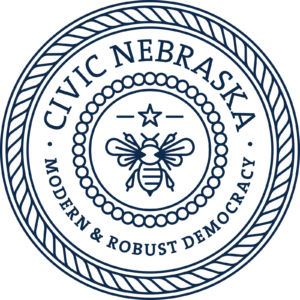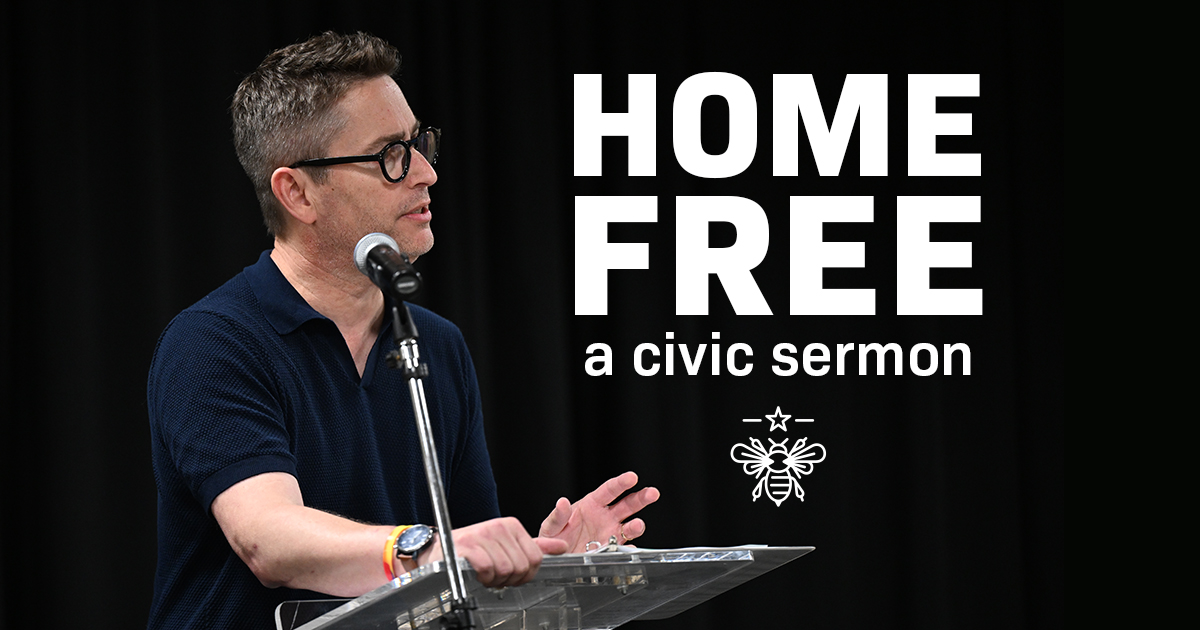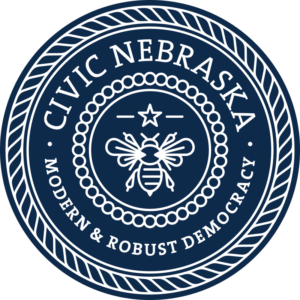On June 8, 2024, Civic Nebraska convened Civic Saturday at First-Plymouth Church in Lincoln. The gathering included original poetry, live music, readings, and a “civic sermon” from Civic Saturday Fellow Steve Smith, the communications director at Civic Nebraska. To hear full audio of the June 8 gathering, click here.

Thanks for joining us today in this wonderful space. Our partnership with First-Plymouth continues to grow, and we are so grateful to gather here in Mayflower Hall this morning.
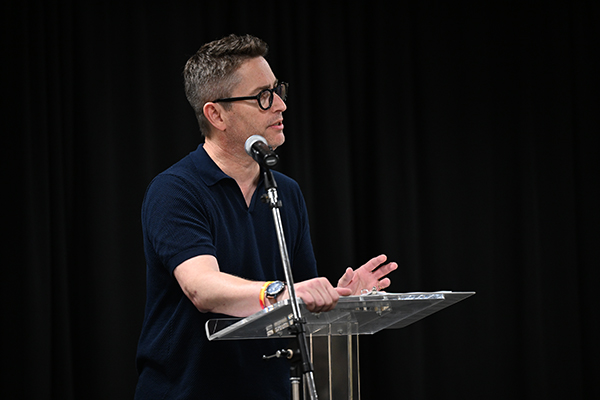 For a discussion about the notion of “home,” it’s fitting that we’re in a place that shares a name – Plymouth – with an early address for Europeans on this continent. And this fellowship hall shares the name of their famous ship. As schoolchildren, we all learned the story of the Pilgrims – 1620, Myles Standish, the first Thanksgiving.
For a discussion about the notion of “home,” it’s fitting that we’re in a place that shares a name – Plymouth – with an early address for Europeans on this continent. And this fellowship hall shares the name of their famous ship. As schoolchildren, we all learned the story of the Pilgrims – 1620, Myles Standish, the first Thanksgiving.
One Pilgrim, in particular, had an awful lot to be thankful for, that’s for sure. His name was John Howland. Does anyone know the name John Howland? Let me tell you about him.
John Howland was an indentured servant from Huntingtonshire, England. During the 66-day journey across the Atlantic, storms continually punished the Mayflower, forcing everyone below deck for long stretches. It was a rough trip.
One day, Howland decided to go topside for some air. Naturally, at that point, the Mayflower took a violent roll. Howland was flung off the ship and into the sea.
But somehow – miracle of miracles – he survived. He survived because, on his way overboard, he grabbed at a topsail rope, which just happened to be trailing along in the ocean behind the ship. Howland hung on long enough for the Mayflower’s crew to haul him back aboard, more dead than alive.
A month or so later, after finally arriving near modern-day Cape Cod and some 200 miles north of the Mayflower’s original destination, Howland was among the 41 men on board to sign the Mayflower Compact, officially establishing their new society – and also introducing the first framework for American democracy on this continent.
Well, he was eventually able to work off his indenture. He became a free man, built a home, got married, and had ten children. More than two and a half million Americans are descended from John Howland. They include lots of familiar names: Jane Austen. Ralph Waldo Emerson. Henry Wadsworth Longfellow. President Franklin D. Roosevelt. Both Presidents Bush. Chevy Chase. Humphrey Bogart. William H. Macy. Mary Chapin Carpenter. Sarah Palin. Joseph Smith.
It’s true. They’re all cousins.
This remarkable story of an unremarkable man reminds us that our actions and choices can ripple forward through time and space, with incalculable results. In this case, John Howland not drowning altered the political, artistic, literary, and religious future of a nation that was still 150 years from forming, officially at least.
The Pilgrims may have had a vague sense of the chain reaction, both good and not so good, that they were touching off when they landed at Plymouth. But I kinda doubt it. They were modest people: They simply wanted a place where they and their families could be safe. A place where they were free to be their authentic selves. A place where they felt they belonged.
They wanted to make a home in America.
In doing so, they gave the so-called New World its most powerful social construct. There are few ideas as simple, and yet as complex, as the idea of home, especially at the national scale. Over the centuries, nearly every one of our national conversations and arguments has centered or touched on what home means to us as Americans.
I know one thing for sure: Home is practically super-glued to the idea of the self-made American. It’s tightly bonded to those values, ideals, and aspirations. Stability. Prosperity. Upward mobility. Domestic tranquility.
Home is also the ultimate signifier of status and belonging. As we struggle with divisions between “us” and “them,” we also struggle with a clear, modern definition of what home means to our American identity today. And, to put a finer point on it, how we all fit into this big old red-white-and-blue House of ours.
So let’s talk about it. It’s a good day to look at the notion of America as home. First, let’s consider what this has meant over time. Then, let’s look at what this means – or doesn’t mean – today. And finally, let’s consider what it might mean as we strive to coexist in our modern democracy.
OK. Our original notion of home.
Let’s examine a time of unrest in America. The nation is dealing with deep cultural divisions, it’s fighting over immigration, and it’s wrestling with rising inequality. It’s a time of rapid technological change, social and industrial disruption, and widespread anxiety. It’s also a time of polarized politics and extreme distrust.
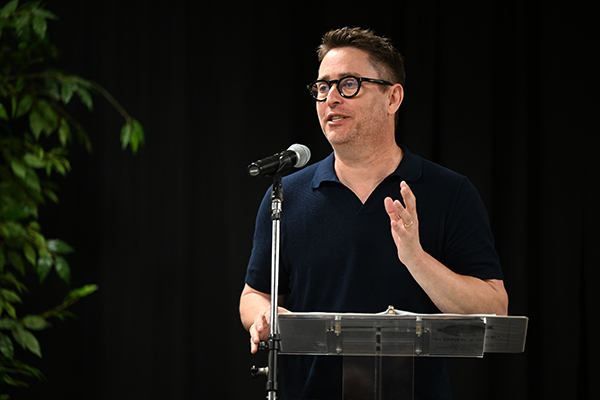 So, what – June 8, 2024? No – this is the late 19th and early 20th centuries. A period we now call The Gilded Age. If you know your U.S. history, you know this era was marked by a wave of new arrivals to our shores. It was when my grandmother’s family emigrated from northern Germany to Nebraska. And predictably, it was a time of heated debate about who counted as an American.
So, what – June 8, 2024? No – this is the late 19th and early 20th centuries. A period we now call The Gilded Age. If you know your U.S. history, you know this era was marked by a wave of new arrivals to our shores. It was when my grandmother’s family emigrated from northern Germany to Nebraska. And predictably, it was a time of heated debate about who counted as an American.
We tend to think of this era as a libertarian dreamscape, a time of rugged individualism. But for average, workaday Americans, the common social construct was still largely influenced by the spirit of the Mayflower Compact. It was still communal. It was still collective.
Put another way, the basic unit of the United States in those days was not the individual. It was the home.
And that meant the home played a role in who was considered a quote-unquote “real” American. This is something that the entrenched interests of the time stubbornly guarded. The Reconstruction Amendments – 13, 14, and 15 – gave formerly enslaved peoples life and liberty, but stopped short of the third one, that essential signifier of “legitimate” American citizenship: Property.
That, after all, was the true litmus test, the ultimate validation of American-ness. After all, The Gilded Age was only a few decades removed from most American rights being the exclusive domain of landowning men. Just as the Framers of our Constitution wanted it.
So yeah, this was a pretty good deal – I mean, for the landowning white men that I descended from, at least. But it wasn’t such a sweet deal for African Americans, or Chinese immigrants, or women, or the Native tribes who inconveniently occupied all that valuable land out west.
Here’s historian Richard White. He says: “Position people outside the home, and rights as well as respectability slip away. Tramps were the epitome of the era’s dangerous classes. Vagrancy – homelessness – became a crime. Single working women were called ‘women adrift’ because they had broken free of the home…” He goes on: “European immigrants, too, found their political rights under attack when they supposedly could not sustain true homes. Tenements were (considered) ‘the death of the home.’”
I bring up this era not just because it feels like today in many ways, but because it’s important to remember that it eventually ended. Reform movements of the day caught wise, and they also began using the idea of home to move the needle in their direction – to expand democracy.
That’s right. Progressive forces of the day, from labor unions to trust-busters to suffragists, were elevating the then-radical notion of creating a legitimate home for everyone in America. Not just on paper, but in practice. They manifested this crazy idea that everyone should have a legitimate chance to work hard, get ahead, and chase their dreams.
So much so that by the middle of the 20th century, this idea took hold. We called it The American Dream, and it became a household phrase.
Those battles were hard-won, weren’t they? And because of them, our country is better off today.
Today. Let’s talk about today.
Well, our idea of home has changed with the times, hasn’t it? At some point in our evolution and growth, our country’s main unit seems to have shifted from the collective to the individual. To the rights we, as singular citizens, hold.
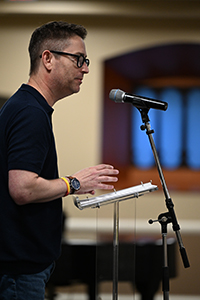 That’s been a little messier. More chaotic. It’s meant a much more complicated and fragmented vision of our nation – and our nationhood. If American rights were legitimized and recognized through the filter of the home from the time of the Pilgrims right up to about a century ago, since then we’ve legitimized and recognized American rights at a much more atomized scale. A more individualized scale.
That’s been a little messier. More chaotic. It’s meant a much more complicated and fragmented vision of our nation – and our nationhood. If American rights were legitimized and recognized through the filter of the home from the time of the Pilgrims right up to about a century ago, since then we’ve legitimized and recognized American rights at a much more atomized scale. A more individualized scale.
And again, that’s not all bad. Over time, this has meant a long overdue emphasis on individual rights in some really important areas for those who have felt like second-class citizens in America. The right to privacy. The right to bodily autonomy. The right to love and marry who you want. Just to name a few.
But if our balance between Pluribus and Unum gets too far out of whack for too long, it tends to send our national priorities into uncharted waters. I mean, the relentless pursuit of individual power, wealth, and prestige eventually comes at a cost in a democracy. Doesn’t leave a whole lot of room for … community. Or empathy. Or the once-ironclad understanding that the many blessings of America are to be shared, not hoarded.
Our current situation, I think, is largely because we seem to lack a new concept for our day-to-day American identity. If the notion of home has waned, what’s replaced it? I think that’s why so many of us feel unmoored and adrift. Isolated, and feeling like outsiders in the place we call home.
I’ll tell you what I fear: The thing that now defines us – our new home – is the video screen. That in our modern, attention-span-challenged nation, with culture moving at the speed of light, our phones and laptops have become the new center of our lives and livelihoods.
Our screens disembody us. Online, we have no ZIP code. Online, we have no area code. And, as mounting evidence shows, online, many of us have no moral code. We shouldn’t be surprised, then, that our culture, and politics, and society at large, have become more hostile. More mistrustful. More frightened.
You hear it on the campaign trail these days, particularly around one topic that always takes center stage in election years. Like clockwork, every two years pundits and politicians raise the specter of an “invasion” at our southern border. With each iteration, the anti-immigrant rhetoric gets scarier – it was bad enough when the lies were “They’re taking our jobs,” and “They’re a burden on our systems.” Now it’s not uncommon to hear, “They’re polluting our culture. They’re stealing our elections. They’re poisoning our national blood.”
How do you build consensus on immigration when that’s the level of discourse?
I could spend hours debunking every one of those slanders, but instead, I’ll just say this. When I hear these kinds of smears, this is what I hear: There’s no more room.
Oh, not in the physical sense. No, what comes in loud and clear is that there’s no more room left here (holds hand over heart). That’s what lands in my ear – that the United States of America, a nation of immigrants, can no longer summon the empathy, much less the political will, to see ourselves in today’s arrivals.
It makes me wonder: Who among those seeking to make their homes here today might be a modern-day John Howland? Who may be the headwater for future presidents, poets, artists, or religious leaders? How will our nation’s destiny be permanently altered because enough of us have decided, Sorry, there’s no more room? (holds hand to heart)
To be clear, this is not an endorsement of so-called “open borders.” Part of the problem with today’s discourse is that it’s so diametric that there is no room for nuance. We are a nation of immigrants, and we are a nation of laws. I can’t offer some snap-my-fingers solution to fix our immigration system. I’m not smart enough, and you have better things to do on a Saturday than to watch me try to stand up here and work it out.
But I will stand up here on behalf of compassion and common sense. And to provide as clear a reminder of America’s great purpose on this planet.
Friends, we are – nearly every single one of us – the children and grandchildren and great-grandchildren of people who, at some point, came here from somewhere else. Some were brought against their will to labor in the southern fields. Others – more fortunate than some – were driven by choice, toward something better. Today, we all are the living, breathing result of those who, eventually, dared to pursue a timeless dream – that life for them, in a place called America, could be better.
That’s our American Home.
And that’s why our country has always been a center of innovation and progress. Every new citizen brings with them new ideas, new perspectives, and new ways of thinking. They help renovate our common space. They make it more beautiful, more functional, more valuable. And more just.
Some argue that the world is too dangerous now, and we have to protect what we have at all costs. But this beloved home of ours is not a museum to be preserved. It can’t be frozen in time or place. It’s a living, breathing structure that requires constant care, attention, and yes, I’ll say it, love. And just as a house gains value when it is cared for with love, so too does our nation.
America is an old house. It constantly needs care. And so we can never clap our hands and declare the work of building and expansion and renovation over. In the long march of human history, this last, great pluralistic project must continue. And I’m here today to assure you, it will – regardless of the man elected in November.
 What each of us does today and every day forward matters – in incredible, far-reaching, yet untold ways. It matters, both for the home we seek to build for ourselves, our children, our grandchildren, and our extended American family. It matters, for untold millions of Americans yet to arrive, yet to be born.
What each of us does today and every day forward matters – in incredible, far-reaching, yet untold ways. It matters, both for the home we seek to build for ourselves, our children, our grandchildren, and our extended American family. It matters, for untold millions of Americans yet to arrive, yet to be born.
What we do today, and each day forward, will ripple through the ages. Our history tells us so. The story of John Howland tells us so.
We Lincolnites, we Omahans, we Nebraskans – we have a special duty to serve as role models for the rest of the country. As residents of a prominent resettlement community, we all know, or know of, people who have left their homelands to make new lives – new homes – right here, in this room of the American House.
Their strength and resilience are remarkable. Their stories and experiences inspire us to do better. To be better.
Just as traveling abroad can break down barriers, promote understanding, and build empathy, engaging with our New American friends and neighbors right here can do the same. Luckily, there is no shortage of entry points for native-born Americans like you and me to help uplift these emerging communities. Whether it’s being an English instructor with Lincoln Literacy, or volunteering at one of our wonderful cultural center, or even advocating for increases in state and local resources for new arrivals, every one of our acts ripples forward.
Sure, it’s work. But the instinct to do so is in our national DNA. It comes from the very start and the crew of the Mayflower. When they realized that a lowly laborer was seconds from being permanently whisked away into the depths of the Atlantic, they didn’t hesitate. Not for a moment. They didn’t stop to debate John Howland’s pedigree, or his hometown, or his upbringing. They didn’t ask whether he deserved to live.
They didn’t ask how much it would cost in labor to bring him back aboard. And they certainly didn’t debate his very humanity or his worthiness. They only saw a human being, hanging on for dear life, so they pulled him aboard. And by doing so, they bent the arc of American history.
Friends, that is what we are now called to do.
We are called to carry on with our centuries-long project of creating a more perfect union. We are called on to create – for the first time in the history of the world – a modern superpower, forged from all over the world, made up of people from all corners of the globe. People of every faith, language, ethnicity, and station. A nation that reflects the diversity and daring of its people; a nation that is the most powerful force for hope and progress around the globe.
We are all called to take hold of the rope – with urgency. And what’s more – what’s more – we are all called to lift one another up. Together.
Thank you for giving me the honor of speaking today.

